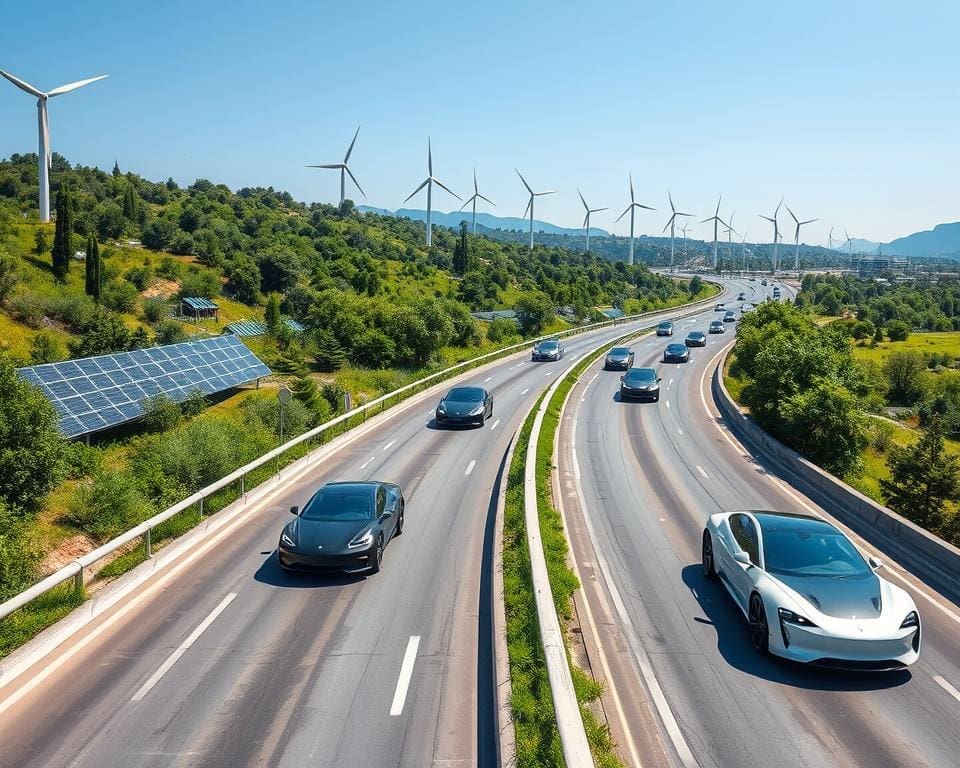Electric cars are much more than just a trend; they represent a transformative shift in the transportation sector, heralding a future that prioritises eco-friendly vehicles and sustainability. With the advent of electric mobility, we witness a crucial component in the global strategies aiming to combat climate change and reduce greenhouse gas emissions.
As technology advances, the adoption of electric cars becomes increasingly accessible and appealing, paving the way for a cleaner, healthier environment. The benefits of these eco-friendly vehicles extend beyond lowering carbon footprints; they encompass remarkable improvements in efficiency and energy consumption that promise to reshape our cities and lifestyles.
The Rise of Electric Vehicles
The electric vehicle (EV) market has transformed dramatically, establishing itself as a cornerstone of sustainable transportation. Awareness among consumers has surged, largely driven by the escalating concern for the environment and the incentive structures set by governments. The influx of new technology, especially advancements in battery performance and charging infrastructure, has significantly contributed to this progress.
Understanding the Electric Vehicle Market
In recent years, the EV market has witnessed exponential growth. Reports suggest a striking increase of 70% in electric vehicle sales within the UK in 2021 alone. Key factors influencing this upward trend include:
- Advancements in battery technology, allowing for longer range and shorter charging times.
- Decreasing costs of electric vehicles, making them more accessible to consumers.
- Shifts in consumer preferences towards more eco-friendly options, reflecting a broader commitment to sustainable transportation.
This evolving landscape has led to a broader variety of models, catering to diverse consumer needs—from compact cars to luxurious SUVs. Market analyses conducted by organisations such as the Society of Motor Manufacturers and Traders (SMMT) predict a positive trajectory as manufacturers increasingly commit to electrification.
Key Players in the Industry
Leading electric car manufacturers such as Tesla, Nissan, and BMW are at the forefront of the electric vehicle revolution, championing innovation and sustainability. Traditional automakers like Ford and Volkswagen are pivoting towards electric models, marking a significant shift in the automotive industry. This transition involves substantial financial investments in research and development to enhance EV offerings.
The growing competition among these electric car manufacturers is expected to foster technological advancements and drive prices lower. Such dynamics not only make electric vehicles more appealing to mainstream consumers but also encourage strategic partnerships across the industry. Reports from the International Energy Agency (IEA) emphasise that these collaborations are integral to maintaining momentum in the push towards electrification.

Electric Cars: Driving Towards a Sustainable Future
The shift towards electric mobility marks a pivotal moment in our approach to environmental sustainability. Many recognise sustainable electric cars as a formidable solution in the fight against climate change. Understanding what makes these vehicles sustainable reveals their potential for reshaping our transportation landscape.
What Makes Electric Cars Sustainable?
Sustainable electric cars primarily thrive on their minimal emissions during operation. Unlike traditional petrol or diesel vehicles, electric cars produce no exhaust emissions. This factor significantly diminishes urban air pollution, enhancing air quality for communities. Furthermore, when charged from renewable energy sources, these vehicles can dramatically lower their carbon footprint across their entire lifecycle. Eco-friendly cars often incorporate sustainable materials in their manufacturing processes, amplifying their environmental impact.
Impact on Carbon Footprint
The adoption of electric cars yields a notable reduction in a nation’s carbon footprint. Research highlights the extensive benefits of transitioning to electric mobility as an essential strategy for achieving climate objectives. In the UK, studies indicate that electric vehicles can lead to up to a 70% decrease in emissions when compared to traditional models, even when factoring in emissions stemming from production and energy generation. This evidence underscores the vital role of electric vehicles in driving us toward net-zero targets and illustrates their promise for a more sustainable future.
Benefits of Electric Cars
The transition to eco-friendly cars presents numerous advantages that extend beyond mere convenience. Embracing electric vehicles not only contributes to a greener planet but also offers tangible benefits for both individuals and society.
Environmental Advantages of Eco-Friendly Cars
Electric cars play a significant role in sustainable transportation due to their environmental advantages. With minimal tailpipe emissions, these vehicles help in reducing air pollution, leading to cleaner cities and improved public health. Furthermore, the reduction of noise pollution enhances the quality of life in densely populated regions, allowing communities to thrive in peaceful environments.
Cost Savings and Incentives for Electric Vehicle Owners
The financial benefits of owning an electric vehicle are compelling. Drivers can experience substantial cost savings through lower running costs and diminished maintenance expenses compared to traditional petrol or diesel vehicles. Electric vehicle incentives offered by the UK government, such as the Plug-in Car Grant, further encourage the shift towards eco-friendly cars by subsidising their initial purchase costs. According to reports from the Office for Zero Emission Vehicles, these incentives effectively drive the adoption of electric vehicles among consumers and businesses.
The Importance of Electric Car Charging Infrastructure
The success of electric vehicles in the UK hinges significantly on the growth of a reliable and accessible charging infrastructure. As electric car adoption surges, the importance of developing comprehensive UK charging networks becomes increasingly evident. The evolution of these networks is critical to alleviating concerns about range anxiety and ensuring that electric car charging options remain convenient for users throughout their journeys.
Current Charging Networks in the UK
As of 2023, the UK boasts over 42,000 charging points available to electric vehicle owners. This extensive network caters to a variety of needs, from rapid chargers capable of providing significant power in under an hour to slower options that are more suitable for home charging. Public charging stations are continuously being installed, with the government and private enterprises working hand in hand to enhance accessibility. The presence of reliable charging infrastructure plays a pivotal role in shaping consumer confidence regarding electric vehicle purchasing decisions.
Future Developments in Charging Technology
The horizon for electric vehicle charging developments appears bright, marked by innovations in charging technology. Ultra-fast charging systems are on the rise, enabling drivers to replenish their batteries quickly and efficiently. Wireless charging options are garnering attention as well, promising a truly seamless experience. Furthermore, smart charging technology adds another layer of convenience by allowing users to optimise their charging times and integrate renewable energy sources into their electric car charging routines. Reports indicate that artificial intelligence could soon play a role in these stations, ensuring an effortless user experience. These advancements aim to transform the future of electric vehicles, making them not just an alternative, but a primary choice for transportation.
Electric Vehicle Technology Innovations
Electric vehicle technology is progressing at a remarkable pace. This transformation is propelled by groundbreaking battery technologies and innovative systems designed to enhance driver experience. The following sections explore the two vital areas of advancement: battery technologies and smart features.
Battery Technologies Shaping the Future
Battery technologies lie at the core of electric vehicle innovations. The development of lithium-ion batteries has revolutionised the industry, significantly enhancing range and reducing charging times. Such improvements have alleviated previous concerns regarding electric vehicles’ practicality and usability. Furthermore, ongoing research into alternative solutions, like solid-state batteries, promises even greater energy densities while ensuring improved safety standards. Reports from industry experts highlight the importance of refining battery production processes. Efficiency in manufacturing directly influences vehicle costs and accessibility to the broader market.
Smart Features Enhancing User Experience
Modern electric vehicles are increasingly equipped with smart features that enhance user experience and safety. Advanced driver-assistance systems (ADAS) provide crucial support during driving, while navigation systems integrated with real-time traffic updates improve journey efficiency. Vehicle-to-Grid (V2G) technology further exemplifies the marriage of electric vehicle technology with smart systems, allowing vehicles to interact seamlessly with energy networks. The demand for these advanced functionalities showcases a shift towards a more connected driving experience. Insights from leading market analysis firms indicate that consumer preferences for smart features are driving manufacturers to innovate continually, ensuring that electric vehicles remain competitive in a fast-evolving market.
The Role of Clean Energy in Sustainable Transportation
The intersection of clean energy and sustainable transportation promises a transformative approach to mobility. Integrating renewable energy sources into electric vehicle usage enhances the overall benefits associated with electric vehicle sustainability. This synergy leads to a marked reduction in carbon footprints and supports a greener future.
Integrating Renewable Sources in Electric Car Usage
The implementation of renewable energy sources, such as wind, solar, and hydroelectric power, is crucial for powering clean energy vehicles. Adopting these sustainable solutions contributes to an efficient power grid while reducing reliance on fossil fuels. Initiatives across the UK focus on ensuring that the growth of electric vehicle usage aligns seamlessly with the increasing adoption of renewable energy. Reports indicate that leveraging renewable resources can significantly lower emissions and enhance the sustainability profile of electric vehicles.
Government Policies Promoting Clean Energy Vehicles
Government policies play a significant role in steering the automotive industry toward clean energy vehicles. With ambitious goals like ending the sale of new petrol and diesel vehicles by 2030, the UK’s Road to Zero Strategy sets the stage for widespread electric vehicle support. Initiatives led by the Office for Low Emission Vehicles (OLEV) facilitate funding for electric vehicle infrastructure and provide incentives for consumers. These comprehensive policies effectively drive manufacturers to focus on electric vehicle technology, ultimately reshaping the automotive landscape towards sustainable transportation.
Challenges Facing Electric Car Adoption
Electric vehicle adoption faces a myriad of challenges, notably range anxiety and charging accessibility, which are paramount concerns for potential buyers. Many consumers fear that the limited range of electric vehicles might restrict their travel plans compared to traditional petrol cars.
Addressing Range Anxiety and Charging Accessibility
To tackle range anxiety, it is essential to develop an extensive and reliable charging network. This network must not only focus on urban centres but also extend to rural and underserved areas, ensuring that all drivers have access to charging points when needed. Continuous advancements in battery efficiency and improvements in vehicle range are crucial for alleviating apprehension. Educational initiatives that inform consumers about the capabilities of modern electric vehicles can also diminish these concerns. Such efforts can bridge the gap between perception and reality, fostering a more confident approach towards electric vehicles.
Cultural Perceptions of Electric Vehicles
Cultural perceptions significantly impact electric vehicle adoption. Stereotypes portraying electric vehicles as lacking power or being confined to niche markets can obstruct progress. Nonetheless, evolving marketing strategies that emphasise performance and versatility are reshaping these narratives. Insights from consumer behaviour research illustrate that influential community figures play an essential role in changing public attitudes. By challenging prevailing myths and showcasing the practicality of electric cars, industries can enhance acceptance and encourage a wider shift towards sustainable transport.
Leading Electric Car Manufacturers
The electric vehicle market is undergoing a radical transformation, led by a diverse array of manufacturers committed to sustainable mobility. Among the leading electric car manufacturers, Tesla stands out as a trailblazer, renowned for its innovative technology and comprehensive portfolio of electric vehicle models. This pioneering brand has not only set high standards for performance and design but has also significantly influenced consumer expectations for electric mobility.
In the wake of Tesla’s success, traditional automotive giants such as BMW, Audi, and Hyundai are making impressive strides in the electric car segment. Each of these electric vehicle brands is rolling out electric models designed to meet the growing demand across various market demographics. They are investing in new technologies and greener production methods, positioning themselves as key players in this evolving landscape.
Emerging manufacturers like Rivian and Lucid Motors are also making waves, with innovative offerings that appeal to eco-conscious consumers looking for unique features and sustainable practices. Reports from industry analysts indicate that the strategies employed by these leading electric car manufacturers are increasingly shaped by changing consumer preferences, fostering a competitive spirit that drives further advancements in electric mobility solutions.









